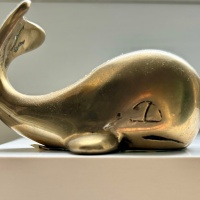 Irene lived in a house on the outskirts of the Walloon village of Tweedledum. She took pride in saying that she was the village’s first but also last inhabitant because her house was the final one on the road that brought visitors in and out of the village. It also marked the entrance into the woods that separated Tweedledum from Tweedledee, another village that lay on the other side of the woods. Irene loved where she lived because most of her windows gave on directly to the woods’ first trees and made her feel like she lived immersed in nature.
Irene lived in a house on the outskirts of the Walloon village of Tweedledum. She took pride in saying that she was the village’s first but also last inhabitant because her house was the final one on the road that brought visitors in and out of the village. It also marked the entrance into the woods that separated Tweedledum from Tweedledee, another village that lay on the other side of the woods. Irene loved where she lived because most of her windows gave on directly to the woods’ first trees and made her feel like she lived immersed in nature.
Nora lived in Tweedledee. Her house also marked the entrance of the woods but on the other side. She didn’t enjoy the quietness of nature as much because a highway ramp lay just a few hundred meters from her front door. Most drivers turned left when they got off the ramp and drove directly in front of Nora’s house into the woods so as to save a few kilometres but also precious time by avoiding the constant traffic on the main road. The shortcut through the woods was hardly secret and Nora saw a procession of cars drive past her windows all day long. The old dirt track that had once only been meant for tractors was now used by most of the local commuters.
The state of the road worsened as you got deeper inside the woods. Drivers thus had to slow down so as not to destroy their vehicles. They came out on the other side at a much slower speed than when they entered the woods in front of Nora’s house. This of course made the whole “driving by” experience much more comfortable for Irene.
One morning, after a BMW barely missed Nora’s toes as she was coming out of her house (country roads have no sidewalks), she decided it was time for a change. She decided to go and see Martin Bayer, Tweedledee’s Mayor, and ask him to block the entrance into the woods in front of her house. This would spare the country road once and for all and give her better her living conditions at the same time. Martin Bayer had been infatuated with her in high school and, each time she saw him at village festivities, she could see that he still had a soft spot for her. “What good are great looks for, if not for this?” she asked herself. She put on her best-knitted shawl and left for his office.
Martin Bayer wasn’t hard to convince. He was of course still taken up with Nora’s ageing charms but he was also reaching the end of his mandate and hadn’t done much for Tweedledee in a while. Closing the entrance to the woods would also force people to drive through the village, which could only help local businesses.
A week later, the poles were up. There were 3 of them, planted in a row. Martin knew that, with the end of his mandate close, he wouldn’t have time to do the whole paper work to have them installed properly by embedding them in cement. He thus mandated two workmen to plant them directly into the earth, one early morning. This way was neither legal or not; it was what was called a “compromis à la belge”.
The next day, Fred, Irene’s son, was supposed to come and get her. He was an entrepreneur and was thus his own boss. Fridays were always quieter for him so they had developed a habit of seeing each other for lunch every week on that day. Irene loved Fridays because she had him all to herself.
When Fred reached the woods on Tweedledee’s side, he pulled over and called Irene.
“Hi mum, it’s me. Do you know when they decided to block the road through the woods? I’m on the other side and can no longer drive through. I’m going to go back onto the motorway and do the whole loop to reach you from the other side. It’s going to take me an additional 20 minutes…this really sucks. I have a meeting at 14h00. I won’t be able to do this detour twice and also take you back after our lunch. We’ll have to postpone. I’ll call you tomorrow.” Irene was livid when she put the phone down. She ruminated about it for a while then put on her purple cardigan, the one she claimed went with everything, and marched herself out of her home. It was a windy day and an aerie sound came from the trees in the woods. She put up the cardigan’s synthetic fur collar and went through the woods, oblivious to the risk of getting a branch on her head.
Going from Tweedledum to Tweedledee through the woods usually took you 15 minutes by foot. This time, it took Irene 8 minutes. When she got to the other side, she stopped, utterly surprised in front of the poles. Three stupid little wooden obstacles that stood in the way of her Friday lunchtimes with her son. She felt so upset, she gave the first pole a kick with the flat of her heel. The earth around it had not yet settled so it moved easily. She continued kicking it until it came totally out of its hole and fell on the ground. She then moved on to the two other ones and gave them the exact same treatment. Pleased with herself, she kicked them to the side and walked back to her house without so much as a glance over her shoulder.
Nora had witnessed the whole scene from her bedroom window. She stood voiceless as she observed the old woman in an ugly purple cardigan kick the poles out of their holes, then off the road. As soon as she left, Nora rushed down stairs and grabbed a hammer from her late husband Ed’s tool rack in the garage. A few minutes later, she was kneeling on the road and hitting the poles firmly back into their holes. She then straightened back up and walked back to her front door, slipping the hammer in the back pocket of her stretch jeans the way a cowboy would slip his gun back into his belt in the far west. Justice had been done.
Irene woke up bright and early the next day. She had called her son the night before to give him the good news that the road was opened again. He confirmed that he would pass by the next morning for a coffee and leave his laundry while he was at it, because, as he explained rightly, “he would be taking time from going to Laundromat to come and see her.” Irene knew he wouldn’t stay long but she nevertheless prepared his favourite meal in case he could have a quick lunch before going back to the city. By 11 o’clock the house was filled with the delicious aroma of “duck à l’orange” as she liked to call it. By 12H30, the duck was cooked and waiting in the oven, ready to be served as soon as Fred walked in. But instead of hearing his car pull up in front of her house, it was the shrill sound of Irene’s telephone that ended her wait.
“Yeah, hi mum, it’s me.” He sounded irritated. “I’m on the other side of the woods. I don’t know who told you the passage was free because the poles are back up again. I can’t drive through. I’ll do the detour and drop off my laundry but won’t have time to come in.”
Irene was very annoyed when she hung up her phone. She went over to her kitchen and transferred most of the dish into a Tupperware. Twenty minutes later, her son’s car stopped in front of her door. She swapped the duck for a bag of dirty t-shirts and underwear then went back inside. She threw the laundry bag on her settee and went straight out again, marching herself straight to the other side of the woods.
The poles were back at the exact same place. She kicked them hard this time, sending them flying off to the ground. When they had all been taken out, she picked each one up and threw it further away into the woods. This time she even filled up the vacant holes with rocks, sticks and whatever else she could find. She would come back this evening to check if someone had put them back in.
Nora was out while Irene was carrying out her vendetta. When she got back from her afternoon shopping, she found the road wide open and cars driving past her house just as before. She rushed into her home and called the mayor’s office to let them know about the repeated vandalism. She described Irene in details, insisting on her purple cardigan with the ugly furry collar but the receptionist didn’t seem to care. She was told that there were no available workers to cast the poles in concrete and that the mayor wasn’t in. Nora could have sworn she heard Martin’s heavy breathing in the background but there was nothing to be done; she would have to take the law into her own hands.
What she needed was something that would fix the poles for good. She went into Ed’s garage and looked around. There wasn’t much that could be used. She was going to leave the room when she saw it. An old forgotten and crumpled bag of Prime organic manure that Ed kept for her rose beds. She paused for a moment then it came to her. She might not be able to pour cement in the holes but she could make sure that the purple cardigan vandal would have the blood of her crime on her hands…or the manure. Nora kneeled down and dusted the cobwebs from the top of the plastic bag, then opened it. The manure was maybe old but it still had that unmistakable clinging stench. She brought a wheelbarrow close, then bent her legs and carefully picked up the bag, making sure not get her sciatic starting again. She grabbed a small spade, opened the garage’s sliding door and pushed the wheelbarrow to the entrance of the woods. It didn’t take her long to find the three poles that had been thrown a little further alongside the road, clearly not the work of an intelligent villain she thought as she picked them up and put them in her wheelbarrow.
The manure’s stench intensified as she dug it out of the bag with her spade. She cleared the holes and filled them half way up with the manure. She then planted each pole back in, making sure to stuff as much manure around the base as possible. Once the three poles were set back into their holes, she looked at what was left over of manure in the bag. She pushed the wheelbarrow to the side and ran back inside the house, going straight into the kitchen. She grabbed her pink rubber gloves she used to wash the dishes and was back at the entrance of the woods in minutes. She put them on and proceeded to spread the rest of the manure all over each pole. Her noble work finished, she pushed the wheelbarrow back into her garage then washed her hands and fixed herself a cup of tea. She sat herself down by her bedroom window and grabbed Ed’s binoculars, waiting for her granny felon to fall into her trap.
When the night came, Irene went out to check if her earlier work was still the way she had left it. She put on an extra cardigan and her favourite pink duffel coat then went into the woods, holding her Maglite in her determined hand.
The poles stood like three insults in the moonlight. She tried to kick the first one but her vision had become weaker with age and it was hard for her to aim in the obscurity. Filled with anger, she rolled up her duffel coat’s pink sleeves. She then knelt down and stretched out her hands towards the first pole.






